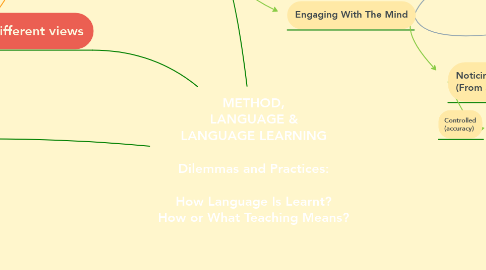METHOD, LANGUAGE & LANGUAGE LEARNING Dilemmas and Practices: How Language Is Learnt? How or What Teaching Means?
by Mar Daniela

1. Learning takes place when comprehensible input occurs, being the interactional output its consequence (Long's Input Hypothesis)
2. All humans are born with innate knowledge of Linguistic Principles (Chomsky's L.A.D and U.G.)
3. Innatists / Cognitivist
4. Traditional view
5. "Approaches and methods can be studied not as prescriptions for how to teach but as a source of well-used practices, which teachers can adapt..." (Richards and Rodgers) method =useful
6. Post-Method era
7. Different views
8. Language Classroom Practices -What Teachers Teach? -How Learners Learn?
9. Habits (Behaviorist)
10. The Place Of Grammar Teaching
11. L1 In The Classroom
12. For -Enhancing Noticing Skills -Underpinning Interlanguage -Drawing comparissons, translations, etc
13. Against -Developing Input Processes -Recognizing Other Languages (Metalanguage, Instructions, Activities, etc)
14. L2 In The Classroom Dilemma: focus on forms or focus on form?
15. -Focus on Forms -Deductive Method -Explicit Grammar (consciously) through Instruction -Direct Teacher Intervention -Focus on Language Form -Grammar and Language pointed in a pre-determined sequence -Language seen as a system of grammatical rules (Brown, Ortega, Long, Phillipson)
16. -Focus on Form -Inductive Method -Implicit Grammar (unconsciously) through Exposure -Indirect Teacher Intervention -Focus on Language Content and Meaningful communication -Draw learner's attention to grammar without explaining it explicitly (noticing) (Cook, Ellis, Thornbury, Schmidt)
17. Language Learning (conscious) and Language Acquisition (unconscious) are different processes (Krashen's Monitor Model)
18. Focus on the way our minds store and process information and make connections with it
19. Learning takes place as learners produce
20. Learners competences are active and interactive while learning
21. Imitation, practice. It is important to avoid errors
22. Stimulus-response-reinforcement (Skinner, PPP aproach)
23. Working With Others (socio-constructivist)
24. Engaging With The Mind
25. Noticing (From a cognitive approach)
26. Controlled (accuracy)
27. Free (Fluency)
28. Group members: Ana Campos Aldana Nuñez Gisela Delgado Manuela Sierra de Evita Marina Daniela Villaverde Vanesa Longhi Pablo Horacio Chiaravalli Hernán Ortiz
29. Drilling aims (accurate repetition of Language Forms)


